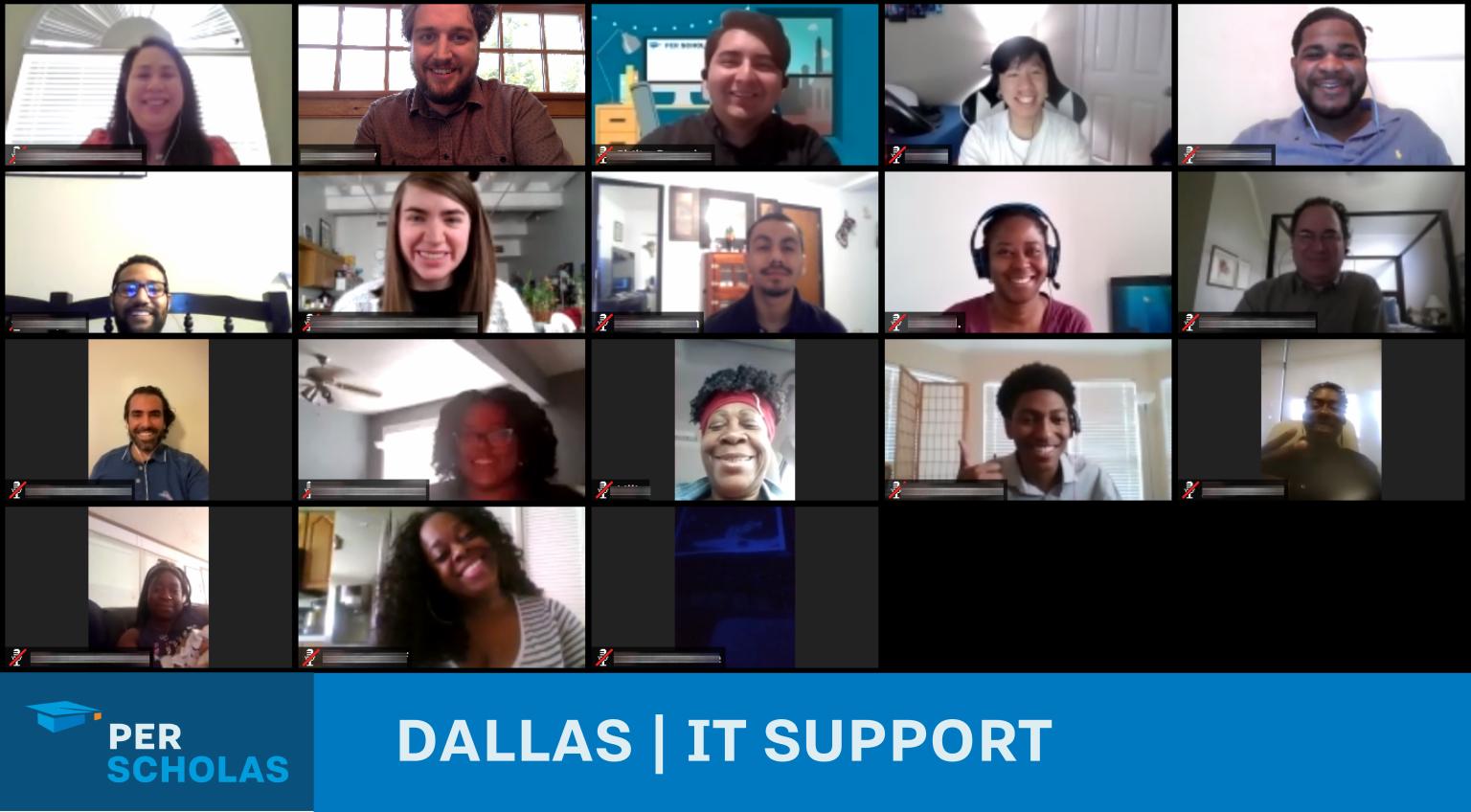Michael Wood, Manager, Education & Workforce
As Texas contemplates the long road to economic recovery from the downturn caused by COVID-19, workforce development programs – such as national nonprofits and Dallas Regional Chamber members Generation USA, Merit America, Per Scholas, and Year Up DFW – will be a critical part of the path forward.
The pandemic, however, has complicated operations for these programs, forcing courses online as in-person gatherings have been largely prohibited. After needs-assessments elevated common student concerns in technology and broadband access, job loss, housing insecurity, transportation, and childcare, each organization has managed the transition to fully virtual programming, adapting courses and offering unique resources to ensure student success and retention.
Generation USA
Generation works to connect underserved youth and mid-career learners across the country to otherwise inaccessible high-skill careers in tech, health care, customer service, and other industries through technical training, professional mentorship, and career coaching.
Locally, the group is offering a customer support supervisor class for employed and recently laid-off retail and hospitality workers. In other cities, Generation is providing training pathways in digital marketing, tech, and health care.
These programs are now exclusively virtual, a considerable shift as only a limited number of Generation’s courses featured online elements previously. Students attend class via video conference and meet individually with their program mentor once per week. Reduced live instruction means students engage in more self-guided learning – a challenging transition for some. Students who need additional support working through the new curriculum may take advantage of virtual office hours with program mentors and career coaches.
Generation is also working on new pathways to address needs emerging from the pandemic. Notably, the nonprofit is in the early stages of developing a contact tracer training program.
Merit America
Merit offers pathways for learners without a bachelor’s degree to upwardly mobile careers, with local offerings in software development and IT. Through flexible courses, Merit provides all of its technical training online and develops professional skills through in-person classes at a variety of locations and times that suit both traditional and non-traditional schedules.
As a result of its hybrid approach to workforce training, Merit was well-positioned to respond to the crisis. After transitioning its professional skills training online, Merit is fully virtual – even offering mock interviews for learners through video calls.
Facing unemployment, unstable internet connections, and increased parenting responsibilities as schools and childcare centers closed, Merit students needed additional support to navigate the transition. In response, Merit built in flexibility to weekly deadlines and instituted a micro-grant program to help learners cover basic and program-related expenses. Both initiatives have seen significant uptake, enabling students to remain in the program. In fact, Merit reports that a majority of its students prefer the fully virtual format due to its convenience and relevance in an increasingly digital economy.
Despite the obstacles, nearly all – 92% – of Merit’s Dallas Region learners are on track to graduate this month and next. Prospective graduates will soon begin interviewing with Merit’s employer-partners, including JPMorgan Chase, Amazon, Infosys, and HCL.
Given the success of the fully virtual model, Merit will be launching August cohorts in software development and IT in addition to an advanced manufacturing track later this year, with plans to rapidly expand all pathways to meet urgent employment needs, both for workers displaced by the pandemic and industries desperate for qualified staff.
Per Scholas
Through an intensive 10-15 week in-person classroom experience, Per Scholas opens doors to transformative tech careers for diverse, unemployed, or underemployed adults. With a traditional model dedicated to physical space and face-to-face relationship building, Per Scholas had to reimagine hands-on learning and employer engagement when pivoting to virtual programming.
Immediately, Per Scholas loaned laptops and hotspots to students who lacked access to technology. Per Scholas also scaled student services from its New York team – such as social workers and financial coaches – across all its locations, resources previously unavailable to students in other regions. Additionally, Per Scholas’ Student Experience team helped identify students who needed financial support and distributed $75,000 in emergency funding through a foundation gift.
Similarly, the shift to virtual learning has enabled Per Scholas to leverage corporate partnerships from across the country, offering students exposure to employers outside their immediate region or career development, and networking opportunities. In an increasingly virtual world, such experiences may turn into job opportunities for Per Scholas’ graduates.
For its efforts, Per Scholas has seen overwhelmingly positive retention, as 96% of its students remained enrolled and active in the program two months after the shift to virtual programming.
Year Up DFW
Year Up offers a year-long training program for underserved young adults in app development, IT support, and business operations. Over the first six months, Year Up students develop rigorous technical and professional skills through a community college partner and program staff. Upon completion of the first phase, students are matched to an internship with a local employer in their area of study.
As the COVID-19 crisis unfolded, Year Up’s DFW cohort was in the middle of the internship phase of the program. Year Up transitioned to fully virtual programming through a host of new supports, from technology loans and transportation assistance to financial aid to supplant lost income or cover basic expenses.
Wherever possible, Year Up coordinated with corporate partners to enable students to complete internship work from home. Students unable to do so have been provided industry-specific curriculum to apply and refine their technical skills.
Year Up is also supporting its students’ long-term employment prospects. Proactively preparing for a constricted job market, Year Up has been working with corporate partners to place graduates in available entry-level roles. While some initial employment placements may be unrelated to their program of study, corporate partners have committed to prioritize Year Up graduates for relevant positions.
Workforce Development Moving Forward
The lasting consequences of the COVID-19 pandemic only stand to increase demand for workforce training programs. Despite successful transitions to virtual programming, providers caution against the assumption that online classes will significantly expand capacity.
“There is a misconception that if you can go virtual, it is cheaper and scalable,” says Stephanie Valadez, Managing Director of Per Scholas Dallas. “Our biggest concern is making sure students move into sustainable employment. To do that, students really need one-on-one support.”
Further, many providers target students from underserved and under-resourced communities – populations with often unreliable access to the internet, posing additional challenges to scaling enrollment capacity through online programs.
Nonetheless, courses will likely remain wholly online in the short-term, and providers expect to offer hybrid and fully virtual models indefinitely. Although not a solution for all learners, virtual programming opens the door to more nimble learning pathways and may enable providers to serve regions in which they do not have a physical presence.
Providers are also reassessing their pathways to remain relevant and responsive to employers’ post-pandemic needs. For instance, the need for IT and cybersecurity support is sure to expand as many companies pledge to maintain work-from-home arrangements permanently. As pressure builds to keep supply chains local, qualified professionals in advanced manufacturing – and corresponding training pathways – may be in high demand down the road.
Yet neither student demand nor completion make workforce training programs successful. Instead, providers pay attention to long-term job placement and the upward-mobility of students. Achieving those metrics, providers assert, requires willingness on the part of employers to consider and hire nontraditional talent.

